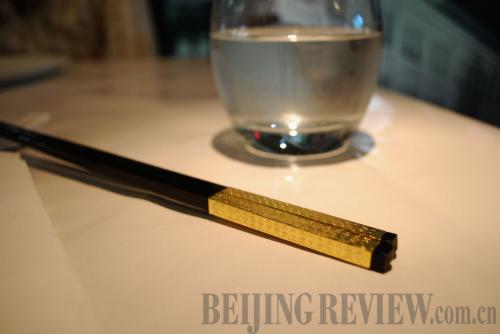| 
Eating habits
The main difference between a Chinese meal and a Western one is that: in the West, everyone has their own plate of food, while in China, dishes are placed in the center of the table and everybody shares. But for foreigners, one of the biggest challenges is using chopsticks instead of knives and forks. Chopsticks, or kuaizi in Chinese, are a major battle for first-time users. Nevertheless, you may quickly get the hang of it given that food is always cut into bite-sized pieces. But if you drop more food on the table than into your mouth, don't worry, you can always ask the waiter to bring you a fork.
In China, the meal usually begins with a set of cold dishes, followed by the main courses such as hot meat, fish and vegetable dishes. Don't be surprised if your host orders more food than you can eat. This is a way for Chinese people to show their hospitality.
A soup is generally served after the main dishes, and desserts are not commonly served, although a selection of fruits usually ends the meal. Drinks are not really part of a meal, except on formal occasions or for celebrations. Besides tea, the two types of alcohol at the table in China are beer, or pijiu, and white spirits, known as baijiu. The latter is fiery strong liquor that is best avoided unless you are a big drinker.
Whilst on the subject of drinking, remember China's ganbei, or bottoms-up, culture. You are most likely to hear it a thousand times during your stay as it means "cheers." Chinese people don't normally start drinking until someone offers the first toast and that person is usually the host or the one who pays the bill. Here is a tip if you can't keep up with the drinking rhythm: after you personally toast your host, which is essential, keep your glass full. That will slow down the refills.
Dining etiquette
If a Chinese dinner has been arranged in a restaurant, the host will usually sit nearest the kitchen or service door. Some hosts, however, seat their most junior guests or family members at this spot so that the host can talk more easily to guests on either side of him. It is also becoming more common for hosts to sit next to foreign guests of honor.
If you are invited to someone's home for a meal, don't forget to take off your shoes before entering and bring a small gift. Sometimes, your host will serve you some portions of food directly into your plate or bowl, because they assume that you're too polite to help yourself. Just remember, the more you'll eat, the happier your host will be!
However, you shouldn't finish every dish on the table, for your host will find it embarrassing if all the food is consumed. But don't worry, you'll probably be full long before that, because people in China tend to serve more food than you can eat.
At the end of the meal, if you feel the need to use toothpicks, which are very common in China, the polite way is to cover your mouth with one hand while using the toothpick with the other.
When it comes to the bill, normally the person who extends the invitation pays for it. A friendly argument (these can get heated) over who pays is a dining ritual, but remember always let your host win the argument or he/she will lose face. If you want to show him/her your gratitude, an invitation for a drink or for karaoke will do the trick.
Eating Don'ts
●Don't stick your chopsticks upright in the rice bowl; it's a bad omen, as it is equivalent to remembering the dead at the table;
●Try not to drop your chopsticks on the floor; it's bad luck;
● Don't flip a fish when the topside has been eaten as it's believed to bring bad luck for fishermen, whose boat might flip too; just pull off the central bone;
●Don't use your chopstick as a drumstick and your bowl as a drum; only beggars strike the bowl when they are begging for food;
●Don't dig into the plate and try to grab the best morsel. Take whatever piece is most readily available; and
●Don't point at people or things with your chopsticks; this is considered very aggressive behavior. |